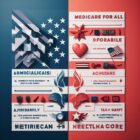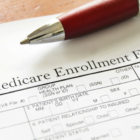Does Medicare Part B Cover Prescriptions – Drug Coverage Guide

Medicare Part B is a federal health insurance covering medical services not covered in the Medicare part A plan. It mainly covers outpatient treatments. Its coverage is divided into two main categories: medically necessary services and preventative care services.
Medically necessary outpatient services include doctor visits, mental health support, durable medical equipment, outpatient care, and home health care services. It also covers preventative care to ensure early diagnosis of diseases for better outcomes. Therefore, it covers screenings such as mammograms and cancer screenings as well as immunizations.
Medicare Part B Drug Coverage
Medicare Part B primarily covers medication prescribed in a doctor’s office or during an outpatient visit. This Medicare prescription drug plan covers the following drugs:
- Vaccinations. Medicare Part B covers certain vaccinations within the limit. It covers pneumococcal shots, Hepatitis B shots, flu shots, shingles shots, COVID-19 vaccine, tetanus shots, etc. Typically, there are two pneumococcal shots. Part B prescription drug coverage covers the first shot at any time. However, the second shot is only covered if given after one year of the first shot. Hepatitis B shots are only covered for people with an increased risk for infection. For instance, people with end-stage renal disease (ESRD), hemophilia, kidney disease, or recent kidney transplant.
- Antigens. Medicare part B covers some antigens as long as they are prescribed and given by a doctor or a qualified healthcare provider.
- Drugs administered using durable medical equipment (DME), such as external infusion pumps and nebulizers.
- Injectables and infused drugs as long as they are prescribed by a licensed medical provider and considered necessary. This also includes injectable osteoporosis drugs for patients who meet the coverage criteria for Medicare home health benefits.
- Erythropoiesis stimulating agents. Medicare Part B approves the administration of erythropoietin by injection for patients with ESRD to treat anemia. It also covers the administration of erythropoietin for patients with anemia, even if they do not have ESRD.
- Oral End-Stage Renal Disease (ESRD) drugs. Medicare part B covers some oral ESRD drugs. It covers calcimimetic medication, including Sensipar. The patient must get these medications from their ESRD facility or a pharmacy that the facility works with.
- Blood clotting factors. Medicare part B covers blood clotting factors for people with hemophilia, even if they inject themselves.
- Intravenous Immune Globulin (IVIG). is administered at home. Medicare part B helps cover IVIG for patients diagnosed with primary immune deficiency disease. However, prior authorization by a licensed doctor is required to indicate that IVIG is medically appropriate.
- Insulin is used with insulin pumps. Medicare covers insulin used with insulin pumps for some people with insulin and other related conditions. In this case, the insulin pumps are considered durable medical equipment.
- Oral cancer drugs. Medicare Part B covers some oral cancer drugs if the same drug is available in injectable form or as a prodrug.
- Oral anti-nausea drug. Medicare part B helps to pay for oral anti-nausea drugs administered as part of chemotherapeutic treatment for cancer. For the drug to be eligible for Medicare Part B drug coverage, it must have been administered within 48 hours after chemotherapy. It should also be a full therapeutic replacement for intravenous nausea drugs.
- Intravenous and tube feeding. Medicare part B covers parenteral and enteral nutrition for certain nutrients that the patient cannot ingest through the mouth or absorb through the intestinal tract.
- Immunosuppressive drugs. Medicare part B covers immunosuppressive drug therapy for up to 36 months if Medicare covers the patient’s organ transplant.
Medicare Part B Drug Coverage Exclusions
Medicare part B does not cover self-administered drugs even if given in an outpatient setting such as an observation or emergency room. Also, it does not cover weight loss, non-prescription drugs, drugs used for cosmetic purposes, fertility drugs, drugs used for sexual or erectile dysfunction, minerals, and vitamins.
These are to be paid for out-of-pocket. The out-of-pocket amount does not contribute towards the out-of-pocket limit for your Medicare coverage.
Also, Part B drug coverage requires that you pay 20% of the approved Medicare prescription drug coverage out of pocket. This is in addition to paying the applicable Part B deductible.
Difference Between Part A vs. Part B Drug Coverage
As mentioned above, part B drug coverage is mainly for drugs prescribed during a doctor’s visit or for outpatient treatment. On the other hand, drug coverage for part B is mainly for prescriptions done in an outpatient setting.
Difference Between Part B vs Medicare Part D Plan Drug Coverage
Generally, Medicare Part D covers a wider range of prescription drugs than Part B. Part D mainly covers medications for chronic and acute diseases, such as antibiotics. That said, some drugs are not covered in Part D but are covered by a part B drug plan.
For example, durable medical equipment such as diabetic test strips, nebulizers, and wheelchairs are not covered by Medicare Part B, but they are covered by Medicare part D coverage.
Conclusion
Medicare Part B covers specific types of prescription medication, such as vaccinations, durable medical equipment supplies, injectable and infused drugs, some antigens, insulin used with insulin pumps, blood clotting factors, immunosuppressive drugs, etc. Certain exclusions and limits apply to different drugs.
The best way to determine if certain drugs are covered under Medicare part B and its prescription drug plan is to talk to your doctor about the prescription medication you need. Then, contact Medicare to find out if the drugs are covered under part B.



